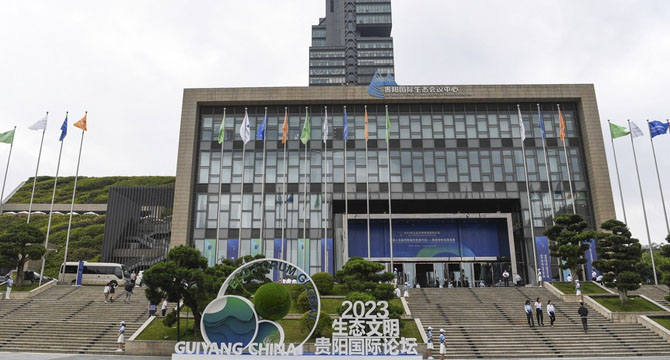GUIYANG, July 11 (Xinhua) — During the two-day-long Eco Forum Global Guiyang 2023, which concluded Sunday at the capital of southwest China’s Guizhou Province, participants spoke highly of China’s contribution to the global cause of promoting ecological conservation and green development.
“We are facing a global climate emergency amid a time when countries are still addressing and rebounding from the socio-economic repercussions of the COVID-19 pandemic,” James George, deputy resident representative of the United Nations Development Programme in China, told Xinhua in an interview.
More efforts must be made to maintain the harmony between humanity and nature to realize the United Nations Sustainable Development Goals for a better future for both people and the planet, he added.
Talking about China’s efforts in ecological conservation, he noted that “China’s efforts in utilizing spatial planning to safeguard and protect key ecological function zones and fragile areas have helped improve the living environment for communities and promote biodiversity conservation.”
“This is one of the lessons that could be shared with other countries in the world for strengthening conservation efforts,” he noted.
During the event, Tamas Hajba, senior advisor for China and head of the Organization for Economic Co-operation and Development (OECD) Beijing Office, told Xinhua that China’s role in tackling climate change and low-carbon transition is very important.
China has a lot of experiences and a lot to share with the world. It is a leading country in terms of the application of renewable energy in the world, Hajba noted.
“More importantly, China has managed to bring down the prices of renewable energies, in other words, to commercialize renewable energies much faster and much earlier than other countries,” he added.
In 2022, China’s renewable energy generation was equivalent to a reduction of 2.26 billion tonnes of domestic carbon dioxide emissions. Its wind power and photovoltaic product exports helped other countries reduce emissions by approximately 573 million tonnes.
The two figures added up to 2.83 billion tonnes of emissions, or about 41 percent of the world’s total carbon emissions reduction converted from renewable energy, data from the National Energy Administration showed.
A firm practitioner for ecological conservation and a pilot in green development, China has also actively shared experiences and cooperated with countries globally to facilitate the harmonious coexistence of man and nature.
Pakistan’s Karot hydropower project epitomizes China’s global cooperation in promoting sustainable development.
The station, constructed by the China Three Gorges Corporation, can generate electricity to meet the daily power demand of about 5 million people while saving around 1.4 million tonnes of standard coal each year.
In an interview with Xinhua, Mostak Ahamed Galib, executive director of the cross-cultural communication and Belt and Road Initiative research center at the Wuhan University of Technology, hailed the China-built Padma multipurpose bridge in Bangladesh.
“Affected by rising sea level and tropical cyclones, which are heavily linked with global climate change, people’s livelihoods in some parts of southwestern Bangladesh significantly deteriorated due to problems including land salinization,” he said.
“The bridge has brought opportunities and new hope to people living in these areas by greatly shortening the trip to the country’s capital city,” he noted. With convenient transportation, thousands of domestic and foreign tourists have come to see coastal mangrove tigers in local forests.
This boosted tourism, increased the income of local residents and raised the awareness of biodiversity conservation, making people better understand how to live harmoniously with nature, he commended.
China is playing a critical role globally in terms of green development and green technology, Yanga Viwe Socikwa, a national community member of the Young Communist League of South Africa, said in an interview at the forum.
He hoped to apply China’s strategies and tactics in the context of his own country and advance projects that balance environmental protection and economic growth, such as the transformation of coal mines.
Tu Ruihe, head of the UN Environment Programme China Office, expected China to continue to support international multilateral cooperation and lead global environmental governance with more active and pragmatic actions to build a community with a shared future for mankind.
“We hope that China will share experiences in the fields of low-carbon transformation, green development, environmental protection, and ecological restoration, and support developing countries in green transformation,” he said in a keynote speech at the forum.

